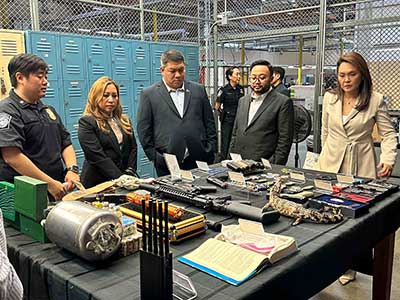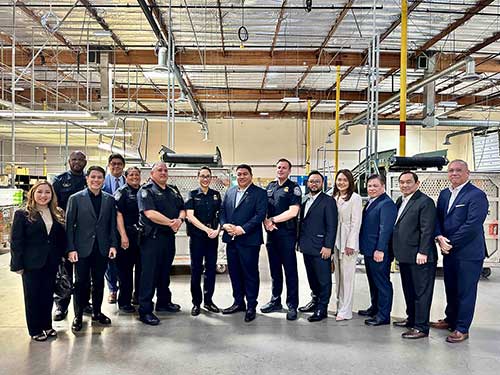LOS ANGELES – The U.S. Department of State’s Export Control and Related Border Security (EXBS) program and U.S. Customs and Border Protection (CBP) hosted officials from the Philippine Bureau of Customs (BOC) in Los Angeles from June 24 to 28.
The visit aimed to share best practices on port security and operations.
The delegation, led by BOC Commissioner Bienvenido Y. Rubio, toured key facilities including Long Beach Seaport, Los Angeles International Airport (LAX), U.S. Coast Guard Marine Base, and the Air and Marine Operations Center in Riverside. Accompanying Rubio were Deputy Commissioner Vener Baquiran and District Collectors from major Philippine ports.
“The best practices we have observed and the discussions we had with our U.S. counterparts will help us when the BOC formulates new policies and improves operational guidelines when we go back to the Philippines,” Rubio said.
A primary focus of the visit was to enhance the Philippines’ capabilities in detecting currency smuggling and contraband interdiction. BOC officials exchanged information with special agents from the LAX-based Homeland Security Investigations office.
“Our Philippine visitors benefited from the expertise of CBP officers in airport currency smuggling detection and enforcement, which was all arranged under the EXBS program. In the future, we are planning to bring CBP experts to the Philippines to assist the BOC in identifying travelers with undeclared currency entering and exiting the country,” said Ransom Avilla, the Regional EXBS Advisor at the U.S. Embassy in Manila.
The EXBS program, managed by the U.S. State Department’s Bureau of International Security and Nonproliferation, provides training workshops for partner countries like the Philippines. These workshops cover international air cargo interdiction, seaport interdiction, and counter-proliferation investigation.
Through the EXBS program, the U.S. continues to support the Philippines in improving border security capabilities, enhancing its strategic trade management system, and preventing the proliferation of weapons of mass destruction. The collaboration aims to strengthen enforcement measures and foster a secure trading environment.























